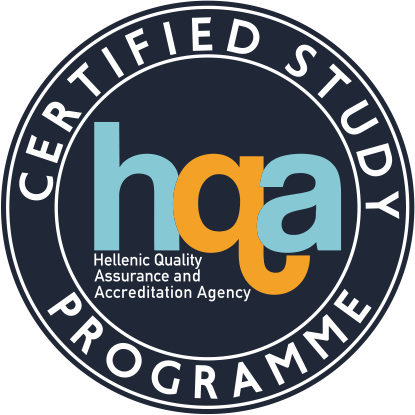Teaching Methodology
Undergraduate level | 4th semester | Compulsory Unit | ΓΕ1004
Credit Units ECTS: 5
Teaching Hours (Weekly): 3
Course Type: Specialty Background
Prequisites: --
Teaching and Examination Language: Greek
For Erasmus students study course and exams are offered in English.

Course Material
- The evolution of teaching science,
- teaching as theory and practice,
- teaching science and teaching practice,
- main features of teaching,
- teaching principles and means of teaching,
- teaching factors, “teaching triangle”, teaching field, factors of learning reinforcement
- teaching aims and objectives,
- teaching process, prerequisites of effective comprehensive teaching of a learning unit,
- models of teaching objectives taxonomy, integrated systems of teaching objectives,
- concept of Curriculum in modern teaching
- kinds and principles of Curricula,
- factors affecting teaching material selection,
- integrated cross-curricular thematic Syllabus, learning activities’ flexible zone
- drawing up the daily/weekly teaching program,
- learning and teaching scenarios and systems,
- teaching strategies,
- teaching models,
- supplementary/alternative teaching techniques
- teacher personality.
Learning Outcomes
This subject examines teaching as a phenomenon of communication, where teachers and students are involved in procedures and activities that aim at approaching and understanding newly-provided knowledge within learning settings that facilitate individualization, participation choice and decision making. Students are expected to be familiarized with the scientific branch of Teaching, with its basic concepts and terminology and with major issues regarding modern research on the area. On the completion of the courses students are expected to:
- Understand differences between traditional, modern and postmodern teaching
- Be familiarized with basic principles of modern teaching
- Know conflicting issues and aspects of teaching and factors reinforcing learning
- Be able to construct teaching core aims and specific objectives while differentiating them from learning outcomes
- Use effectively teaching strategies and learning techniques
- Know the fundamental forms of teaching and their specific features, as well as the alternative teaching strategies that facilitate learning.
- Be able to plan and design properly a teaching unit
- Know the cornerstones of professional teaching effectiveness
General Skills
- Development of pedagogical consciousness and professional ethics
- Promotion of free, reflective and creative thinking
- Boosting of teaching ability
- Development of teaching autonomy and self-regulation
- Students’ familiarization with individual and group activities
Learning and Teaching Techniques - Evaluation
Teaching Methods: Face to face | Support of learning through the use of asynchronous tele-education platform (e-class).
Use of ICT: Use of ICTs during teaching, use of asynchronous tele-education platform for distant education and communication with postgraduate students, contact through e-mail.
Course Organization:
| Activity | Semester Work Load |
|---|---|
| Lectures | 25 |
| Learning interaction during teaching | 20 |
| Individual/non-guided studying | 40 |
| Short individual activities for knowledge assimilation and feedback | 20 |
| Group work activities | 20 |
| Total | 125 |
Assessment Methods:
Student performance’s assessment is based on written examination, which provides students with the 100% of the final overall grade. It takes place after the completion of the course period and comprises:
- close ended questions
- multiple choice questions with short answer argumentation
- cloze
- term definition
- reflective thinking issue writing through the study of teaching scenarios
Moreover, students are provided with the opportunity to voluntarily write an essay based on the study and comprehensive rendering of the content of literature articles about a specific issue on education and pedagogy. The essay provides the 20% of final overall grade. Main criteria for the assessment of the written essay are:
- Educational correctness, scientific substantiation of the answers.
- Ability to use correctly concepts, notions, terms that have been studied and analyzed during the course.
- Reflective and composing ability as regards studying and use of sources and material provided.
- Innovativeness and creativity of educational and teaching proposals.
- Expressiveness, clarity and comprehensiveness of the answers.
- Thought organization, effective structure of the written essay.
- Morphological features of a written essay
The abovementioned criteria are described to the students during the first teacher-student meeting, and are displayed in the e-class website throughout the semester.
Suggested Bibliography
- Χατζηδήμου, Δ. (2015). Εισαγωγή στη Θεματική της Διδακτικής. Θεσσαλονίκη: Αφοί Κυριακίδη.
- Καψάλης, Γ.Α. & Νημά, Α.Ε. (2008). Σύγχρονη Διδακτική. Θεσσαλονίκη: Αφοί Κυριακίδη.
- Hunt, G., Wiseman, J. D. & Touzel, J.T. (20094). Effective teaching: Preparation and implementation. USA: Charles C. Thomas Publisher.
- Peety, G. (2014). Teaching Today. A Practical Guide. U.K.: Oxford Press.
Scientific Journals
- Improving Schools
- Educational Studies
- Teaching and Teacher Education
- School Effectiveness and School Improvement



